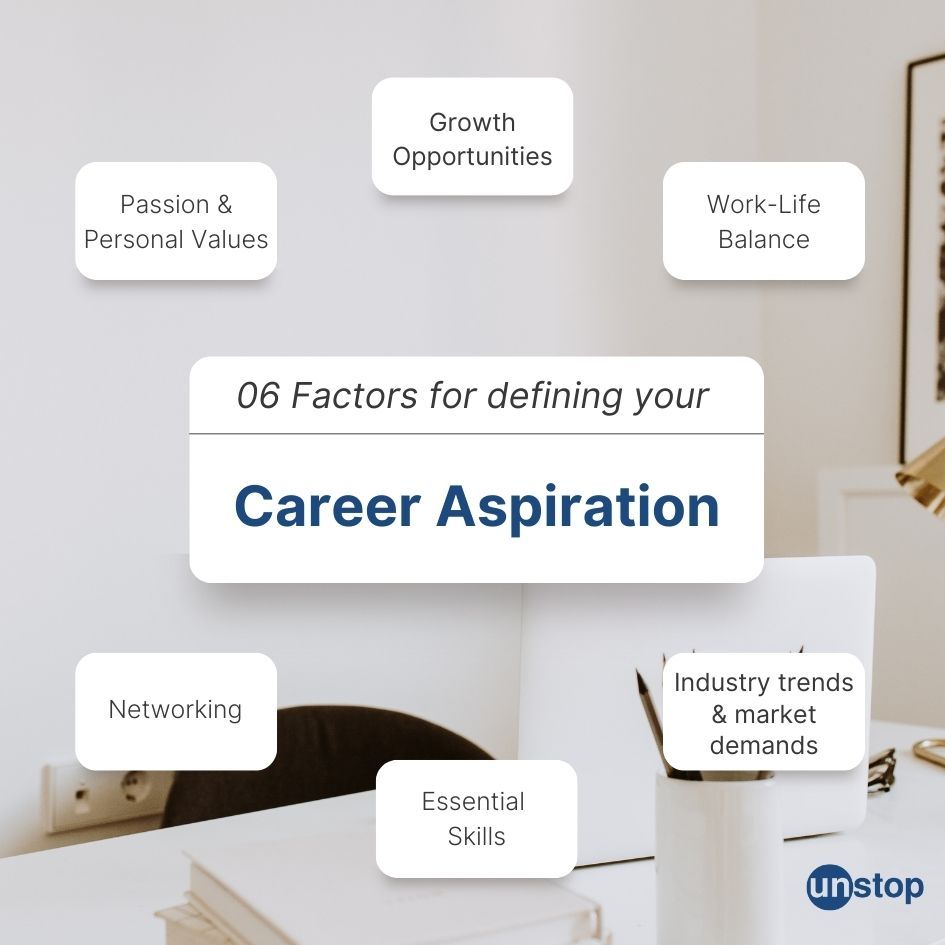- Career Aspirations: Meaning & Purpose
- What Are Your Aspirations? Sample Answers
- What Is Career Aspirations?: Sample Answers for Freshers
- Defining Career Aspiration: Key Factors
- Taking Action Towards Career Aspiration
- Self-Reflect to Answer "What Are Your Career Aspirations?"
- Examples of Career Aspirations
- Tips To Answer What Is Your Career Aspirations
- Conclusion
- Frequently Asked Questions
What Is Your Career Aspiration?: Get Best Answers For An Interview

To have a clear and solid career aspiration is to have accomplished half of one’s professional journey. Career aspirations are the long-term hopes, ambitions, and goals one has for one's professional development. It indicates that an individual has a direction and purpose-driven outlook.
By setting clear career aspirations, individuals can focus on achieving them and making informed decisions about education, training, and job opportunities. Not to mention the help it provides in answering the interview question, what is your career aspiration?
In job interviews, crafting a well-thought-out statement about your career aspirations can demonstrate enthusiasm, motivation, and clarity in one's thought process. Read ahead to understand the best way to answer this common interview question:
Career Aspirations: Meaning & Purpose
Career aspirations are like roadmaps that help you navigate the twists and turns of your professional journey. They give you a clear vision of where you want to be in the future, helping you set goals and make informed decisions along the way.
By identifying your occupational aspirations early on, you can focus on acquiring the necessary skills, knowledge, and experiences to reach those goals.
 However, there are some pros and cons of fixing your career aspirations.
However, there are some pros and cons of fixing your career aspirations.
- Pros: Having well-defined career aspirations provides clarity and direction, enabling you to make strategic choices that align with your long-term goals.
- Cons: A rigid mindset or fixed career aspiration may hinder your growth. It's essential to remain flexible as circumstances may change or new opportunities may arise that require adaptation to ensure continued growth.
Role Of Career Aspirations In Achieving Professional Success
Your career aspirations act as a driving force behind your pursuit of professional success. When you have a clear vision of what you want to achieve, staying motivated and overcoming obstacles along the way becomes easier. By setting ambitious yet realistic goals based on your professional aspirations, you can push yourself to reach new heights.
Successful professionals often attribute their achievements to having clear career aspirations that guide their decision-making process throughout their careers.

What Are Your Aspirations? Sample Answers
A compelling response to "What are your career aspirations?" is crucial for a good first impression. To help you express your career aspiration effectively, here are some examples of well-crafted answers that can inspire and guide you:
Aligning Aspirations With Specific Industries Or Roles
When articulating your career aspirations, you can demonstrate how they align with specific industries or roles. For example:
- Example 1: "My career aspiration is to become a marketing manager in the fashion industry. I have always been passionate about both marketing and fashion, and I believe this role would allow me to combine my creativity with my strategic thinking skills."
- Example 2: "I aspire to work as a software engineer in the technology sector. The fast-paced nature of this industry excites me, and I am eager to contribute my problem-solving abilities and technical expertise towards developing innovative solutions."
By highlighting your passion for a particular industry or role, you show that you have thoughtfully considered your future path.
Tailoring Your Answers Based On Individual Circumstances
Everyone's career aspirations are unique and influenced by their individual circumstances and experiences. Here are some examples that showcase how you can tailor your responses accordingly:
- Example 1: "My ultimate goal is to own my bakery someday. Baking has always been my passion since childhood, and I have honed my skills through culinary courses and working part-time at local bakeries. My aspiration is to create delicious pastries that bring joy to people's lives."
- Example 2: "I aim to become a social worker specializing in helping underprivileged communities. Growing up in an underserved neighbourhood inspired me to make a difference in the lives of others facing similar challenges. By providing support and resources, I hope to empower individuals and create lasting change."
What Is Career Aspirations?: Sample Answers for Freshers
Here are a few sample answers that freshers (new graduates) can use when asked, "What are your career aspirations?" in a job interview, tailored to different scenarios:
Scenario 1: Entry-level role in your field of study
-
"My career aspiration is to build a strong foundation in [your field of study] and become a valuable asset to your team. I'm eager to learn from experienced professionals and contribute my skills and knowledge to real-world projects. In the long term, I see myself [mention a specific career path within your field]."
Example: "As a recent graduate in computer science, I'm passionate about software development. My goal is to learn from experienced developers here and become a skilled programmer. I'm particularly interested in [mention a specific area of software development, if applicable]. In the long run, I aspire to become a full-stack developer and contribute to innovative software projects."
Scenario 2: Role in a broader field related to your studies
-
"While my degree is in [your field of study], I'm also interested in the broader field of [related field]. This position in [mention the specific department/area] particularly excites me because it allows me to learn about [mention something specific about the role that aligns with your broader interest]. My long-term goal is to [mention a career path that combines your studies and broader interest]."
Example: "I recently graduated with a degree in marketing, but I'm also fascinated by the world of social media and its impact on marketing strategies. This social media marketing role particularly appeals to me as it allows me to leverage my marketing knowledge in a dynamic online environment. In the future, I hope to become a social media marketing specialist and develop creative campaigns that engage audiences across different platforms."
Scenario 3: Highlighting your transferable skills and eagerness to learn
-
"My main career aspiration is to develop my [mention a transferable skill] skills and gain experience in a fast-paced environment. I'm a quick learner and a team player, and I'm confident I can adapt to new challenges. This role in [mention the role] seems like a great starting point because it allows me to [mention specific aspects of the role that will help you develop your skills]. In the long term, I'm open to exploring different opportunities within the company that align with my growing skillset."
Example: "As a recent graduate, I'm eager to develop my communication and problem-solving skills in a professional setting. I'm a highly motivated individual with a strong work ethic. This customer service role seems like a perfect fit as it allows me to interact with people and learn how to address their needs effectively. In the future, I'm open to exploring different opportunities within the company, potentially in project management, where I can utilize my communication and problem-solving skills on a larger scale."
Defining Career Aspiration: Key Factors

There are several key factors that you should consider to effectively express your career aspirations and provide a clear and comprehensive understanding of your professional ambitions:
Passion & Personal Values
One important factor to emphasize when discussing your career aspirations is passion. It is essential to convey genuine enthusiasm for the field or industry you wish to pursue. By demonstrating your passion, you show potential employers that you are truly dedicated and motivated to achieve your professional goals.
Expressing how your career aspirations align with your personal values is also important. Employers value individuals who are passionate about their work and share similar values with the organization.
Growth Opportunities
Another factor worth mentioning is the availability of growth opportunities within the chosen career path. Highlighting the potential for advancement and skill development can showcase your ambition and long-term commitment. Employers value individuals who are eager to learn and grow within their roles.
Work-Life Balance
Work-life balance has become increasingly significant in today's fast-paced world. When expressing your career aspirations, it is crucial to consider how the chosen profession aligns with your desired work-life balance. This could involve flexible working hours, remote work options, or a supportive company culture that promotes well-being outside of work.
Industry Trends & Job Market Demands
Considering industry trends and future job market demands is vital when discussing your career aspirations. Staying informed about the latest developments in your chosen field demonstrates foresight and adaptability. It also shows employers that you are aware of emerging opportunities and challenges within the industry.
Essential Skills
Highlighting essential skills relevant to your desired career path is crucial in expressing your aspirations effectively. Identify transferable skills that can be applied across different roles or industries as they demonstrate versatility and adaptability.
Networking Opportunities
Networking plays a significant role in advancing one's career prospects. Discussing networking opportunities related to your career aspirations showcases proactive behavior and an eagerness to connect with professionals in your field. It also demonstrates your commitment to building relationships and expanding your professional network.
Taking Action Towards Career Aspiration
Identifying your career aspirations is only the first step. Here are some actionable steps you can take:
- Research: Dive into various industries or fields related to your interests.
- Networking: Build connections with individuals already working in the industries that interest you.
- Gain Experience: Seek opportunities related to your desired field to gain practical experience.
- Set Short-Term Goals: Break down your long-term career aspirations into smaller, achievable goals.
- Seek Guidance: Reach out to mentors or career counsellors for support.
Self-Reflect to Answer "What Are Your Career Aspirations?"
There are various approaches you can take while exploring your career aspiration. One way is self-reflection, which involves looking inward and examining your interests, values, and skills. By understanding yourself better, you can gain clarity on what you truly want in your career.
Self-reflection allows you to identify and align your passions with potential career paths. Consider asking yourself questions like:
- What activities do I enjoy doing the most?
- What subjects or topics am I naturally drawn to?
- What skills do I excel at?
- What impact do I want to make in my chosen field?
By delving into these questions, you can uncover valuable insights that will help shape your career aspirations.
Short-Term vs. Long-Term Career Goals
Self-reflection is not only about understanding yourself but also about exploring different career stages. It involves considering short-term and long-term goals, as well as remaining open to flexible approaches.
Short-term goals focus on what you want to achieve in the near future. These goals could include gaining specific skills or experiences to propel you forward in your desired field. For example:
- Completing an internship or apprenticeship
- Attending relevant workshops or competition programs
- Networking with professionals in your industry
- Acquiring certifications or degrees
Long-term goals encompass where you see yourself further down the line—perhaps five or ten years from now. These goals may involve reaching higher positions within a company, starting your own business, or making a significant impact in a particular area of expertise.
Evaluating Core Values For Career Choices
To ensure alignment between personal values and career choices, individuals should self-reflect. Here’s how to do that:
- Identify core values: Reflect on what matters most in life - honesty, integrity, creativity - and identify those core values that define yourself.
- Research potential careers: Explore different career options and evaluate whether they align with your core values. Consider the company's mission, culture, and the nature of the work involved.
- Seek guidance: Connect with professionals and find mentors in fields of interest for their advice on how their careers align with their personal values.
- Reflect on past experiences: Think about past experiences where you felt fulfilled and satisfied. Identify the common elements that made those experiences meaningful, and consider how they can be incorporated into a future career.
Examples of Career Aspirations
To provide some inspiration and guidance, let's explore a range of examples that demonstrate well-defined and realistic career aspirations. These examples span different industries, positions, and growth trajectories:
Diverse Examples Of Career Aspirations
- Entrepreneurship: Many individuals aspire to become successful entrepreneurs, starting their businesses in various fields such as technology, fashion, or food. They envision creating innovative products or services and being their own boss.
- Medical Profession: Some people dream of becoming doctors, nurses, or other healthcare professionals. They aim to make a difference in people's lives by providing medical care and improving public health.
- Creative Arts: For those passionate about art, music, or writing, pursuing a career in the creative arts can be an exciting aspiration. This may include becoming a professional artist, musician, or author.
- Engineering: Many individuals are drawn to engineering careers due to their interest in problem-solving and innovation. They may aspire to become civil engineers designing infrastructure projects or software engineers developing cutting-edge technologies.
- Environmental Conservation: With growing concerns about the environment, aspiring conservationists aim to protect natural resources and combat climate change through careers in environmental science or sustainability.
- Business Management: Some individuals aspire to climb the corporate ladder and hold leadership positions within organizations. They set goals to become managers or executives responsible for strategic decision-making.
- Education: Those passionate about teaching often aspire to become educators at different levels—elementary school teachers who shape young minds or professors who inspire university students.
Tips To Answer What Is Your Career Aspirations

When responding to questions about your career aspirations, it's important to provide practical advice that demonstrates your thoughtfulness and preparation. Start by clearly stating your long-term goals and then break them down into smaller, achievable steps. This shows that you have a clear vision of where you want to be in the future and are actively working towards it.
Here are some practical tips to help you structure and deliver impactful answers showcasing clarity, specificity, and authenticity.
- Be specific: Rather than giving vague or generic answers, provide specific details about the industry, role, or field you aspire to work in. This helps the interviewer understand your level of commitment and passion.
- Showcase alignment: Highlight how your skills, experiences, and values align with your desired career path. This shows that you have done your research and have a genuine interest in pursuing this particular field.
- Share examples: Use concrete examples from past experiences or projects to illustrate how you have already taken steps toward achieving your career aspirations. This demonstrates initiative and proactive behavior.
- Stay authentic: Be true to yourself when discussing your career aspirations. Avoid giving answers that you think the interviewer wants to hear but don't align with who you are as an individual.
To emphasize these qualities in your answers, consider the following:
- Clearly state your long-term career goals.
- Explain why you are interested in that particular industry or role.
- Share any relevant experiences or skills that support your aspirations.
- Express how achieving these goals aligns with your values and personal growth.
Conclusion
Remember, finding your career aspirations can be a long process. Be patient, embrace new opportunities, and don't be afraid to make changes along the way. Understanding and expressing your career aspirations is crucial for professional success.
Explore different approaches, consider personal values, and align them with your career plans for informed decisions. Remember to reflect regularly and reassess your aspirations as you advance in your career.
Frequently Asked Questions
1. How do I determine my career aspirations?
Determining your career aspirations involves self-reflection, researching various industries and job roles, assessing your skills and interests, seeking guidance from mentors or career counsellors, and exploring different opportunities through internships or volunteering.
By combining these strategies, you can gain insights into what motivates you professionally and identify the path that aligns with your goals.
2. Can my career aspirations change over time?
Yes, it is common for career aspirations to evolve as individuals gain more experience, knowledge, or exposure to different opportunities. Personal growth, changing circumstances, or new interests may influence a shift in career aspirations. It's important to be open-minded and adaptable as you navigate through various stages of life.
3. Should I share my long-term goals during an interview?
While it's essential to demonstrate ambition during an interview by discussing long-term goals aligned with the company's vision, it's also important to balance realistic expectations and aspirations. Focus on how your short-term goals can contribute to the company's success, highlighting the skills and experiences you aim to gain along the way.
4. How do I align my personal values with my career aspirations?
Aligning personal values with career aspirations involves identifying what is important to you in terms of work-life balance, ethics, social impact, or personal fulfillment. Reflect on your core values and seek opportunities that resonate with them. Research companies and industries that prioritize similar values, ensuring a better alignment between your personal beliefs and professional pursuits.
5. What if I'm unsure about my career aspirations?
If you are uncertain about your career aspirations, consider exploring different fields through internships, part-time jobs, or informational interviews. Engage in self-reflection exercises or seek guidance from mentors or career counsellors who can help you identify your strengths, interests, and potential paths worth exploring. Remember that it's okay to be unsure at times; what matters is taking proactive steps toward discovering your true passion and purpose.
Suggested reads:
Instinctively, I fall for nature, music, humor, reading, writing, listening, traveling, observing, learning, unlearning, friendship, exercise, etc., all these from the cradle to the grave- that's ME! It's my irrefutable belief in the uniqueness of all. I'll vehemently defend your right to be your best while I expect the same from you!
Login to continue reading
And access exclusive content, personalized recommendations, and career-boosting opportunities.
Subscribe
to our newsletter















Comments
Add comment